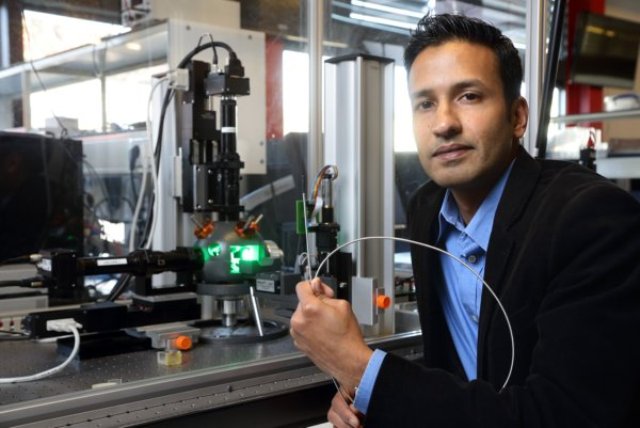Dec 3 2014
Sarthak Misra of the University of Twente MIRA Research Institute has been awarded the prestigious individual ERC Starting Grant worth 1.5 million euros. This grant will be used for the ROBOTAR research project. ROBOTAR aims to develop systems for the targeted delivery of magnetic agents. These agents would be robotically steered into the human body with extreme precision using flexible needles. The agents would be controlled by using an external magnetic field. The agents could be coated with drugs or bio-sensors.

Inserting needles is one of the most common minimally invasive medical procedures. It is used during biopsies, but also when inserting radioactive particles into the body for the treatment of prostate cancer, for example. Needles have the disadvantage that they are rigid and sometimes miss their target, for example because of the patient or an organ motion. Also, using rigid needles makes it impossible for clinicians to move their way around tissue or bones.
Misra and his team have made significant advances in the area of ultrasound-guided robotic needle steering. The needles have an asymmetric bevel tip, which allows for them to be steered through the body in various directions. By rotating the needle, clinicians can manipulate the needle in three dimensions. The novel needles that would be developed as part of ROBOTAR can travel long distances within the human body and reach the target with millimeter-level precision.
Magnetic agents
In the ROBOTAR system, the flexible needle injects miniaturized magnetic agents (microrobots) into the body, such as nanoparticles, magnetotactic bacteria or ‘MagnetoSperm’ (microrobots based on the workings of sperm cells). Using an external magnetic field, the ROBOTAR system can steer the magnetic microrobots, which could be equipped with drugs or bio-sensors. Drug delivery is accurate to the micrometre (one thousandth of a millimetre).
The ROBOTAR project will run for five years. Once the project has been concluded, Misra hopes to have developed a prototype system. But before that, several parts of the system will most likely already be available to be used in clinical practice.
Source: http://www.utwente.nl/